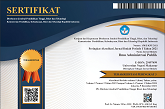Building Pancasila Civilization in Industrial Era 4.0 for Millennial Generation
(1) Universitas Negeri Makassar
(*) Corresponding Author
DOI: https://doi.org/10.26858/jiap.v10i1.14136
Abstract
Pancasila as the basis and ideology of the Indonesian state is a set of values that become a way of life for the Indonesian state, this condition ensures that the foundation of the state and the practice of national and state life must be based on the values contained in the Pancasila. The main challenges in grounding Pancasila in this globalization era are; decreased intensity of understanding of Pancasila in society, social exclusivism related to the swift flow of globalization so that it leads to a stronger tendency for identity politicization and social fragmentation based on SARA, decreased morality of millennial generation caused by the flow of information and technology that is not filtered properly as a result of the current industrial era 4.0. The efforts made in facing challenges in the millennial generation are fostering the spirit of nationalism, planting and practicing the values of Pancasila and using the internet wisely, building ideas and future visions of a strong young generation based on Pancasila morality.
Keywords
Full Text:
PDFReferences
Andrew, J., Henry, S., Yudhisthira, A. N., Arifin, Y., & Permai, S. D. (2019). Analyzing the Factors that Influence Learning Experience through Game Based Learning using Visual Novel Game for Learning Pancasila. Procedia Computer Science, 157, 353–359. https://doi.org/https://doi.org/10.1016/j.procs.2019.08.177
Calvert, J. (2004). The Mythic Foundations of Radical Islam. Orbis, 48(1), 29–41. https://doi.org/https://doi.org/10.1016/j.orbis.2003.10.014
Darmaputera, E. (1988). Pancasila and the search for identity and modernity in Indonesian society: A cultural and ethical analysis. Brill.
Dijkink, G. (2009). Geopolitics and Religion (R. Kitchin & N. B. T.-I. E. of H. G. Thrift (eds.); pp. 453–457). Elsevier. https://doi.org/https://doi.org/10.1016/B978-008044910-4.00778-1
Handayani, I., & Winarno, D. W. (2016). Pancasila Sumber Nilai Keberagaman Beragama Bangsa Indonesia. Jurnal Seminar Nasional Hukum, 3.
Ismail, A., Sulur, A. H., Akib, H., & Salam, R. (2016). Snapshot of Society Social-Economic Welfare based on Human Development Index in Polewali Mandar Regency, Indonesia. International Conference on Public Organization VI (ICONPO VI), 847–858.
Juneman, Meinarno, E. A., & Rahardjo, W. (2012). Symbolic Meaning of Money, Self-esteem, and Identification with Pancasila Values. Procedia - Social and Behavioral Sciences, 65, 106–115. https://doi.org/https://doi.org/10.1016/j.sbspro.2012.11.099
Muhaimin, H., & Fil, S. (2013). Indonesia now. Between Pancasila and crisis of democracy in Indonesia. International Journal for Public Management and Politic Development, 1(1), 23–37.
Nasrullah, M. (2016). Implementasi Sistem Informasi Manajemen Berbasis Teknologi Informasi Di Universitas Negeri Makassar. Jurnal Ilmiah Ilmu Administrasi Publik, 5(2), 53–63.
Prasodjo, T. (2019). Knowledge Management: Sustainable Human Resource Development in Public Sector Organizations. Jurnal Ad’ministrare, 6(2), 159–166.
Siswomihardjo, K. W. (2001). Ilmu Pengetahuan: Sebuah Sketsa Umum mengenai Kelahiran dan Perkembangannya sebagai Pengantar untuk Memahami Filsafat Ilmu. Disajikan Pada Internship Filsafat Ilmu Pengetahuan Universitas Gajah Mada, Yogyakarta, Tanggal, 2–8.
Siswoyo, D. (2013). Philosophy of education in Indonesia: Theory and thoughts of institutionalized state (PANCASILA). Asian Social Science, 9(12), 136.
Sitorus, J. H. E. (2016). Pancasila-based Social Responsibility Accounting. Procedia - Social and Behavioral Sciences, 219, 700–709. https://doi.org/https://doi.org/10.1016/j.sbspro.2016.05.054
Sudarmi, S., Sunusi, S., & Syam, A. (2019). Development of human resources In the perspective of the career development of teachers at the State Vocational School in Makassar City. Jurnal Ad’ministrare, 6(1), 45–50.
Sudaryanti, D., Sukoharsono, E. G., Baridwan, Z., & Mulawarman, A. D. (2015). Critical Analysis on Accounting Information Based On Pancasila Value. Procedia - Social and Behavioral Sciences, 172, 533–539. https://doi.org/https://doi.org/10.1016/j.sbspro.2015.01.399
Article Metrics
Abstract view : 1147 times | PDF view : 156 timesRefbacks
- There are currently no refbacks.
Copyright (c) 2020 A. Aco Agus

This work is licensed under a Creative Commons Attribution 4.0 International License.
Diterbitkan oleh:
Program Studi Ilmu Administrasi Publik
Program Pascasarjana Universitas Negeri Makassar
JIAP Index By:

This work is licensed under a Creative Commons Attribution 4.0 International License.









